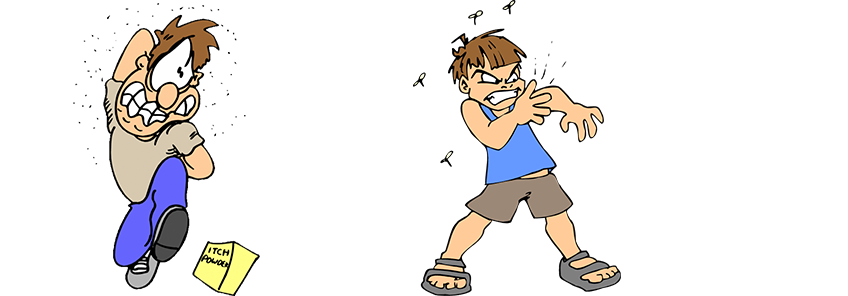Itching

Itching, also known as pruritus, is an uncomfortable and irritating sensation of the skin that induces an urge to scratch. An itchy skin most of the time is caused by a skin condition. Not infrequently, an itchy skin is a manifestation of a systemic disease. An itchy skin might be red and inflamed or it may appear normal.
Causes
- Dry Skin: Most of the time an itchy skin is because of dry skin. A dry skin is easily irritable. Many people have dry and itchy skin in shins of lower legs, elbows,hands and sides of the abdomen. The dryness is further worsened by overuse of soap, hot bath, antiperspirants. Low humidity contributes to dry and itchy skin.
- Skin diseases: Skin diseases like eczema, psoriasis, ringworm, scabies, lice and hives/urticaria causes itchy skin with areas of skin that are red, inflamed with bumps and blisters. These can be localized or generalized depending on the skin involvement. Sometimes parasitic infection can cause itchy skin as the parasite burrows under the skin.
- Systemic diseases: Advanced kidney failure, liver disease, iron deficiency anemia, solid organ cancer, blood cancer, thyroid disease can cause itchy skin. Viral infection and bacterial infections can cause skin rash that itch.
- Nerve disorders: Diabetes mellitus, pinched nerves, shingles and multiple sclerosis can cause skin itching.
- Allergic reactions: Wool, jewellry, plants , cosmetic agents can cause localised itching to the exposed area because of an allergic reaction.
- Medications: Opiates can cause significant skin itching. Antibiotics and antifungals cans also cause generalised itching.
- Pregnancy.
- Psychological or obsessive states.
However, the cause of itching remains unknown in many instances. It is called itch of unknown cause.
Diagnosis
Most of the time the cause of an itchy skin is an obvious skin condition or a very dry skin. If you have severe itching for a fairly long duration and the cause is not clear, then you should see your doctor. If the itching is recurrent, has spread all over the body, you should seek medical help as it might be suggesting a serious disease.
Some of the tests done are:
- Blood tests to look for anemia, raised white blood cells, raised ESR etc., Fasting blood glucose.
- Calcium, phosphate, alkaline phosphatase.
- Renal function and electrolytes.
- Liver function tests.
- Thyroid function tests.
- Imaging as necessary.
Treatment
Treatment of itchy skin consists of anti- itching medicine, treatment of systemic diseases and prevention of dry skin.
Medicine:
- Oral antihistamines can be used to reduce itching.
- Ultraviolet B therapy is useful in treating itching due to uremia.
- Topical corticosteroids are used in inflammatory skin conditions Occasionally antidepressants may be given if itching becomes very distressing.
- Local anesthetics (benzocaine topical cream) may also help reduce intense itching or burning pain.
Treatment of underlying systemic disease:
- Iron deficiency anemia: Iron supplements.
- Treatment of thyroid disorders, liver and kidney disease.
Prevention of dry skin
- Use moisturizers especially during winter and after a bath.
- Avoid scratching or rubbing the area. Cut nails short to prevent from skin damage.
- Wear cool, loose fitting clothes, avoid woolen clothings especially in the area of itch.
- Use only mild soap and lukewarm water to bathe. Apply soothing lotion after bath.
- Try relaxation techniques to divert your concentration on itching.
- Avoid vasodilators like alcohol, caffeine etc and prolonged stay in hot humid conditions.
- Prefer cotton over woolen in clothings.
- Use protective gears like gloves when coming in contact of chemicals and irritants.
- Avoid using a lot of cosmetic products.



Send us your feedback on this article